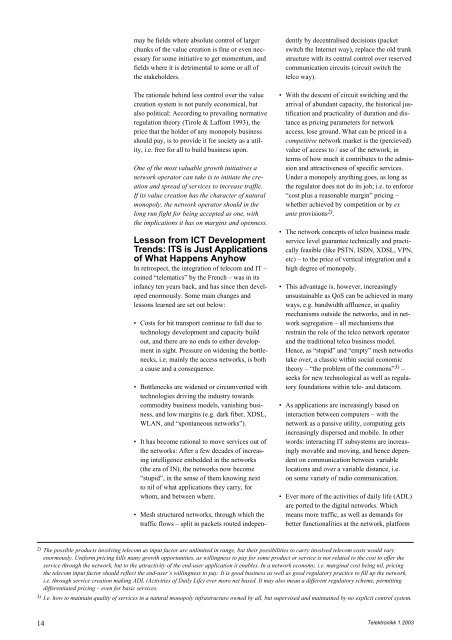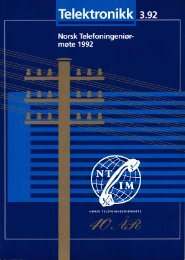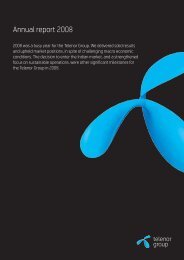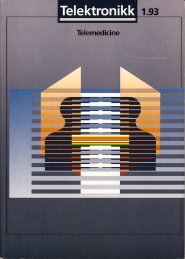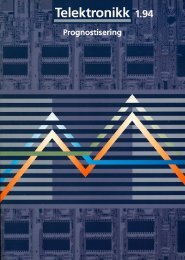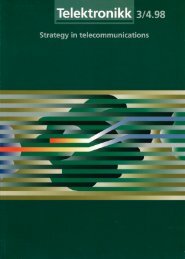Intelligent Transport Systems - Telenor
Intelligent Transport Systems - Telenor
Intelligent Transport Systems - Telenor
You also want an ePaper? Increase the reach of your titles
YUMPU automatically turns print PDFs into web optimized ePapers that Google loves.
14<br />
may be fields where absolute control of larger<br />
chunks of the value creation is fine or even necessary<br />
for some initiative to get momentum, and<br />
fields where it is detrimental to some or all of<br />
the stakeholders.<br />
The rationale behind less control over the value<br />
creation system is not purely economical, but<br />
also political: According to prevailing normative<br />
regulation theory (Tirole & Laffont 1993), the<br />
price that the holder of any monopoly business<br />
should pay, is to provide it for society as a utility,<br />
i.e. free for all to build business upon.<br />
One of the most valuable growth initiatives a<br />
network operator can take is to initiate the creation<br />
and spread of services to increase traffic.<br />
If its value creation has the character of natural<br />
monopoly, the network operator should in the<br />
long run fight for being accepted as one, with<br />
the implications it has on margins and openness.<br />
Lesson from ICT Development<br />
Trends: ITS is Just Applications<br />
of What Happens Anyhow<br />
In retrospect, the integration of telecom and IT –<br />
coined “telematics” by the French – was in its<br />
infancy ten years back, and has since then developed<br />
enormously. Some main changes and<br />
lessons learned are set out below:<br />
• Costs for bit transport continue to fall due to<br />
technology development and capacity build<br />
out, and there are no ends to either development<br />
in sight. Pressure on widening the bottlenecks,<br />
i.e. mainly the access networks, is both<br />
a cause and a consequence.<br />
• Bottlenecks are widened or circumvented with<br />
technologies driving the industry towards<br />
commodity business models, vanishing business,<br />
and low margins (e.g. dark fiber, XDSL,<br />
WLAN, and “spontaneous networks”).<br />
• It has become rational to move services out of<br />
the networks: After a few decades of increasing<br />
intelligence embedded in the networks<br />
(the era of IN), the networks now become<br />
“stupid”, in the sense of them knowing next<br />
to nil of what applications they carry, for<br />
whom, and between where.<br />
• Mesh structured networks, through which the<br />
traffic flows – split in packets routed indepen-<br />
dently by decentralised decisions (packet<br />
switch the Internet way), replace the old trunk<br />
structure with its central control over reserved<br />
communication circuits (circuit switch the<br />
telco way).<br />
• With the descent of circuit switching and the<br />
arrival of abundant capacity, the historical justification<br />
and practicality of duration and distance<br />
as pricing parameters for network<br />
access, lose ground. What can be priced in a<br />
competitive network market is the (percieved)<br />
value of access to / use of the network, in<br />
terms of how much it contributes to the admission<br />
and attractiveness of specific services.<br />
Under a monopoly anything goes, as long as<br />
the regulator does not do its job; i.e. to enforce<br />
“cost plus a reasonable margin” pricing –<br />
whether achieved by competition or by ex<br />
ante provisions 2) .<br />
• The network concepts of telco business made<br />
service level guarantee technically and practically<br />
feasible (like PSTN, ISDN, XDSL, VPN,<br />
etc) – to the price of vertical integration and a<br />
high degree of monopoly.<br />
• This advantage is, however, increasingly<br />
unsustainable as QoS can be achieved in many<br />
ways, e.g. bandwidth affluence, in quality<br />
mechanisms outside the networks, and in network<br />
segregation – all mechanisms that<br />
restrain the role of the telco network operator<br />
and the traditional telco business model.<br />
Hence, as “stupid” and “empty” mesh networks<br />
take over, a classic within social economic<br />
theory – “the problem of the commons” 3) –<br />
seeks for new technological as well as regulatory<br />
foundations within tele- and datacom.<br />
• As applications are increasingly based on<br />
interaction between computers – with the<br />
network as a passive utility, computing gets<br />
increasingly dispersed and mobile. In other<br />
words: interacting IT subsystems are increasingly<br />
movable and moving, and hence dependent<br />
on communication between variable<br />
locations and over a variable distance, i.e.<br />
on some variety of radio communication.<br />
• Ever more of the activities of daily life (ADL)<br />
are ported to the digital networks. Which<br />
means more traffic, as well as demands for<br />
better functionalities at the network, platform<br />
2) The possible products involving telecom as input factor are unlimited in range, but their possibilities to carry involved telecom costs would vary<br />
enormously. Uniform pricing kills many growth opportunities, as willingness to pay for some product or service is not related to the cost to offer the<br />
service through the network, but to the attractivity of the end-user application it enables. In a network economy, i.e. marginal cost being nil, pricing<br />
the telecom input factor should reflect the end-user’s willingness to pay. It is good business as well as good regulatory practice to fill up the network,<br />
i.e. through service creation making ADL (Activities of Daily Life) ever more net based. It may also mean a different regulatory scheme, permitting<br />
differentiated pricing – even for basic services.<br />
3) I.e. how to maintain quality of services in a natural monopoly infrastructure owned by all, but supervised and maintained by no explicit control system.<br />
Telektronikk 1.2003


